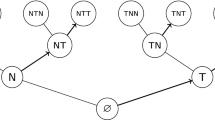Abstract
The fundamental learning model considered here is identification of recursive functions in the limit as introduced by Gold [8], but the concept is investigated on a meta-level. A set of classes of recursive functions is uniformly learnable under an inference criterion I, if there is a single learner, which synthesizes a learner for each of these classes from a corresponding description of the class. The particular question discussed here is how unions of uniformly learnable sets of such classes can still be identified uniformly. Especially unions of classes leading to strong separations of inference criteria in the uniform model are considered. The main result is that for any pair (I, I′) of different inference criteria considered here there exists a fixed set of descriptions of learning problems from I, such that its union with any uniformly I-learnable collection is uniformly I′-learnable, but no longer uniformly I-learnable.
Preview
Unable to display preview. Download preview PDF.
Similar content being viewed by others
References
Baliga, G., Case, J., Jain, S., The Synthesis of Language Learners, Information and Computation 152, 16–43 (1999).
Barzdin, J., Two Theorems on the Limiting Synthesis of Functions, Theory of Algorithms and Programs, Latvian State University, Riga 210, 82–88 (1974) (in Russian).
Barzdin, J., Inductive Inference of Automata, Functions and Programs, in Proc. International Congress of Math., Vancouver, 455–460 (1974).
Blum, M., A Machine-Independent Theory of the Complexity of Recursive Functions, Journal of the ACM 14(2), 322–336 (1967).
Case, J., Chen, K., Jain, S., Strong Separation of Learning Classes, Journal of Experimental and Theoretical Artificial Intelligence 4, 281–293 (1992).
Case, J., Smith, C., Comparison of Identification Criteria for Machine Inductive Inference, Theoretical Computer Science 25, 193–220 (1983).
Freivalds, R., Kinber, E. B., Wiehagen, R. (1995), How Inductive Inference Strategies Discover Their Errors, Information and Computation 118, 208–226.
Gold, E. M., Language Identification in the Limit, Information and Control 10, 447–474 (1967).
Jantke, K.P., Natural Properties of Strategies Identifying Recursive Functions, Elektronische Informationsverarbeitung und Kybernetik 15, 487–496 (1979).
Kapur, S., Bilardi, G., On uniform learnability of language families, Information Processing Letters 44, 35–38 (1992).
Osherson, D.N., Stob, M., Weinstein, S., Synthesizing Inductive Expertise, Information and Computation 77, 138–161 (1988).
Rogers, H., Theory of Recursive Functions and Effective Computability, MIT Press, Cambridge, Massachusetts (1987).
Wiehagen, R., Zeugmann, T., Learning and Consistency, in K.P. Jantke and S. Lange (Eds.): Algorithmic Learning for Knowledge-Based Systems, LNAI 961, 1–24, Springer-Verlag (1995).
Zilles, S., On the Comparison of Inductive Inference Criteria for Uniform Learning of Finite Classes, in N. Abe, R. Khardon, and T. Zeugmann (Eds.): ALT 2001, LNAI 2225, 251–266, Springer-Verlag (2001).
Author information
Authors and Affiliations
Editor information
Editors and Affiliations
Rights and permissions
Copyright information
© 2002 Springer-Verlag Berlin Heidelberg
About this paper
Cite this paper
Zilles, S. (2002). Merging Uniform Inductive Learners. In: Kivinen, J., Sloan, R.H. (eds) Computational Learning Theory. COLT 2002. Lecture Notes in Computer Science(), vol 2375. Springer, Berlin, Heidelberg. https://doi.org/10.1007/3-540-45435-7_14
Download citation
DOI: https://doi.org/10.1007/3-540-45435-7_14
Published:
Publisher Name: Springer, Berlin, Heidelberg
Print ISBN: 978-3-540-43836-6
Online ISBN: 978-3-540-45435-9
eBook Packages: Springer Book Archive




